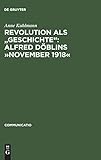Revolution als "Geschichte": Alfred Döblins »November 1918« : Eine programmatische Lektüre des historischen Romans / Anne Kuhlmann.
Material type: TextSeries: Communicatio : Kultur – Text – Medium ; 14Publisher: Tübingen : Max Niemeyer Verlag, [2015]Copyright date: ©1997Edition: Reprint 2015Description: 1 online resource (VII, 195 p.)Content type:
TextSeries: Communicatio : Kultur – Text – Medium ; 14Publisher: Tübingen : Max Niemeyer Verlag, [2015]Copyright date: ©1997Edition: Reprint 2015Description: 1 online resource (VII, 195 p.)Content type: - 9783484630147
- 9783110929447
- PT2607.O35Z74 1997
- online - DeGruyter
- Issued also in print.
| Item type | Current library | Call number | URL | Status | Notes | Barcode | |
|---|---|---|---|---|---|---|---|
 eBook
eBook
|
Biblioteca "Angelicum" Pont. Univ. S.Tommaso d'Aquino Nuvola online | online - DeGruyter (Browse shelf(Opens below)) | Online access | Not for loan (Accesso limitato) | Accesso per gli utenti autorizzati / Access for authorized users | (dgr)9783110929447 |
Frontmatter -- Inhaltsverzeichnis -- Vorwort -- I. Problemstellung -- II. Theorie, Lektüre, Interpretation - wissenschaftstheoretische Aspekte der Konzeption -- III. Methodischer Aufbau der Untersuchung -- IV. Gattungstheorie - der historische Roman als Fiktion -- V. Geschichtstheorie - der historische Roman als Historiographie -- VI. »November 1918« als historischer Roman - Lesarten der Forschung -- VII. Der historische Roman - Programm einer aporetischen Lektüre -- VIII. Revolution als »Geschichte« - »November 1918« -- IX. Zusammenfassung -- X. Schlußbetrachtung -- XI. Literaturverzeichnis -- XII. Index
restricted access online access with authorization star
http://purl.org/coar/access_right/c_16ec
Die Relation von Literatur und Geschichte ist für jeden historischen Roman zentral. Die 'Geschichtlichkeit' der Gattung ist in der bisherigen Forschung meist durch den Wirklichkeitsbezug definiert und der Fiktionalität des Literarischen entgegengesetzt worden. Entwickelt man die Gattungstheorie aber von der Praxis der Lektüre her, so erscheint das Historische auch im Roman in erster Linie als eine sprachliche und narrative Rezeptionssteuerung. Jeder historische Roman kann und muß damit zunächst als Historiographie gelesen werden. Auch das Revolutionsepos "November 1918" von Alfred Döblin (1878-1957) läßt sich intertextuell und interdisziplinär in einen nationalen und internationalen Kontext von 'Revolutionsgeschichten' stellen. Anders als historiographische und publizistische Revolutionsdarstellungen kann "November 1918" jedoch seine eigene Textualität reflektieren und ermöglicht so ein anderes Lesen von Geschichte und Revolution. Das 'Literarische' des historischen Romans kann so exemplarisch über bestimmte Lektüreformen nachgewiesen werden, bleibt aber notwendig und widersprüchlich auf die historiographische Rezeptionsweise bezogen. Das 'Zwitterhafte' dieser Gattung wird somit entgegen gängiger literatur- und gattungstheoretischer Paradigmen nicht zugunsten der Literarizität verkürzt, sondern zum Ausgangspunkt einer interdiskursiven und interdisziplinären Untersuchung gemacht.
Revolutions are not only a fascinating political and historical phenomenon. The perception and description of revolutions also conform to a certain linguistic and literary pattern discernible both in historiography and political journalism. Historical novels centring around revolutions can (also) be read as a form of (political) historiography as they invariably engage with these forms of representation. At the same time, however, historical novels are literary texts and as such cast light on the linguistic nature of historical (re)construction. A literary approach to the epic depiction of revolution in "November 1918" lays bare these contradictory reception alternatives, and in so doing points up the connections between Döblin's presentation of the German November revolution of 1918 and national and international 'revolution (hi)stories' from a large variety of disciplines.
Issued also in print.
Mode of access: Internet via World Wide Web.
In German.
Description based on online resource; title from PDF title page (publisher's Web site, viewed 28. Feb 2023)


